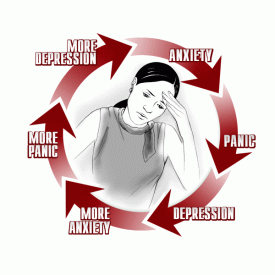[twocol_one]
(Download this article as a PDF)
Everyone feels anxiety on occasion; it is a part of life. We all know what it is like to feel worry, nervousness, fear, and concern. We feel nervous when we have to give a speech, go for a job interview, or walk into our boss’s office for the annual performance appraisal. We know it’s normal to feel a surge of fear when we unexpectedly see a photo of a snake or look down from the top of a tall building. Most of us manage these kinds of anxious feelings fairly well and are able to carry on with our lives without much difficulty. These feelings of fear don’t disrupt our lives.
Unfortunately, millions of people (an estimated 15% of the population) suffer from devastating and constant anxiety that severely affects their lives, sometimes resulting in living in highly restricted ways. These people experience panic attacks, phobias, extreme shyness, obsessive thoughts, and compulsive behaviors. The feeling of anxiety is a constant and dominating force that definitely disrupts their lives. Some become prisoners in their own homes, unable to leave to work, drive, or visit the grocery store. For these people, anxiety is much more than just an occasional flutter in the stomach or sweaty palms.
Types of Anxiety Disorders
An anxiety disorder affects a person’s behavior, thoughts, feelings, and physical sensations. The most common anxiety disorders include the following:
Social anxiety (or social phobia) is a fear of being around other people. People who suffer from this disorder always feel self-conscious around others. They have the feeling that everyone is watching them and staring at them, being critical in some way. Because the anxiety is so painful, they learn to stay away from social situations and avoid other people. Some eventually need to be alone at all times, in a room with the door closed. The feeling is pervasive and constant and even happens with people they know.
People who have social anxiety know that their thoughts and fears are not rational. They are aware that others are not actually judging or evaluating them at every moment. But this knowledge does not make the feelings disappear.
Panic disorder is a condition where a person has panic attacks without warning. According to the National Institutes of Mental Health, about 5% of the adult American population suffers from panic attacks. Some experts say that this number is actually higher, since many people experience panic attacks but never seek treatment.

Do you feel overwhelmed? Can’t make sense of why? Feel stuck in a vicious cycle?

Phone: 760.828.3835
Email: info@fuelforemotionalhealth.com
7720 El Camino Real, Ste. 2B-1
Carlsbad, CA 92009
Treatment
How Therapy Works
Contentment, satisfaction, pleasure. Generally speaking we all want these feelings. We strive for them across gender, culture, and regardless of the nature or our problems. Yet curiously, a host of factors – both in our minds and from the outside world – create obstructions to our feeling great. Therapy can help us identify and overcome such obstacles.
Did you know that therapists are required to have their own therapy? We are forced to learn about ourselves before we are charged with helping others. I have treated psychologists, psychiatrists, students and many others.
A good therapist through training, education and supervised experience can help you in two different ways. Through talking about the things that trouble you, your therapist may offer you immediate tools that you can use to feel better. For example if you are an impulsive person who makes emotional decisions, you may learn to use more of your logical strengths.
But sometimes you may have already learned these skills or naturally use them. For example, using physical exercise to help you sleep. When this is the case, you need a more comprehensive understanding of your problems to make changes that last, and yes it can take time.
Your therapist should tell you how long it could take. Of course, who wants to spend their life in therapy when they could be living instead? But remember, you have been growing, cultivating, and gathering experiences for years and years. You then allow your therapist only 45-50 minutes to understand, solve, and fix your problems and send you on your way—if it were that easy you would have done it yourself. Be respectful of yourself and your intelligence.
Wanting to leave therapy is normal. Therapy is not a battle of wits, but in my experience, all successful outcomes have included a period of wanting to quit therapy. Those that continue have emerged to be not only happier and healthier, but are often earning more financially because of it. Always bring up your feelings about therapy, both positive and negative. Most of the time it can be one of the most important parts of therapy.
The therapy for an anxiety disorder depends on the severity and length of the problem. The client’s willingness to actively participate in therapy is also an important factor. When a person with panic is motivated to try new behaviors, he or she can learn to change the way the brain responds to familiar thoughts and feelings that have previously caused anxiety.[/twocol_one] [twocol_one_last]

Common symptoms of panic include:
- Racing or pounding heart
- Trembling
- Sweaty palms
- Feelings of terror
- Chest pains or heaviness in the chest
- Dizziness and lightheadedness
- Fear of dying
- Fear of “going crazy”
- Fear of losing control
- Feeling unable to catch one’s breath
- Tingling in the hands, feet, legs, or arms
A panic attack typically lasts several minutes and is extremely upsetting and frightening. In some cases, panic attacks last longer than a few minutes or strike several times in a short time period.
As if the panic attacks are not debilitating enough as they occur, they are often followed by feelings of depression and helplessness. Most people who have experienced panic say that the greatest fear is that the panic attack will happen again.
Many times, the person who has a panic attack doesn’t know what caused it. It seems to have come “out of the blue.” At other times, people report that they were feeling extreme stress or had encountered difficult times and weren’t surprised that they had a panic attack.
Generalized anxiety disorder is quite common, affecting an estimated 3 to 4% of the population. This disorder fills a person’s life with worry, anxiety, and fear. People living with this disorder are always thinking and dwelling on the “what ifs”. It feels like there is no way out of the vicious cycle of anxiety and worry. The person often becomes depressed about life and their inability to stop worrying.
People who have generalized anxiety usually do not avoid situations, and they don’t generally have panic attacks. They can become incapacitated by an inability to shut the mind off, and are overcome with feelings of worry, dread, fatigue, and a loss of interest in life.
The person usually realizes these feelings are irrational, but the feelings are also very real. The person’s mood can change from day to day, or even hour to hour. Feelings of anxiety and mood swings become a pattern that severely disrupts the quality of life.
People with generalized anxiety disorder often have physical symptoms including headaches, irritability, frustration, trembling, inability to concentrate, and sleep disturbances. They may also have symptoms of social phobia and panic disorder.
Other types of anxiety disorder include:
Phobia, fearing a specific object or situation.
Obsessive-compulsive disorder (OCD), a system of ritualized behaviors or obsessions that are driven by anxious thoughts.
Post-traumatic stress disorder (PTSD), severe anxiety that is triggered by memories of a past traumatic experience.
Agoraphobia, disabling fear that prevents one from leaving home or another safe place.

The good news is that therapy can make a difference!
Why Fuel Centers? We Offer No Risk Guaranteed Services:
*Trained team of licensed doctors and staff
*Free initial consultation/first individual meeting upon request
*Instructional classes/workshops offer a 6-month full money-back guarantee
*You may qualify for financial adjustment or sliding fee
*Professional courtesy fees available to other clinicians and students
What is more important than your happiness… take control NOW!
[/twocol_one_last]
The Bottom Line
The good news is that therapy can make a real difference. Did you know that research shows that therapy is highly effective for anxiety? Fuel has a competent, professional, and superbly trained staff assembled to meet the needs of you or your loved one suffering with anxiety.
The treatment for an anxiety disorder depends on the severity and length of the problem. The client’s willingness to actively participate in treatment is also an important factor.
When a person with panic is motivated to try new behaviors and practice new skills and techniques, he or she can learn to change the way the brain responds to familiar thoughts and feelings that have previously caused anxiety.
There is no need to avoid your problems – you may simply be avoiding your own happiness!